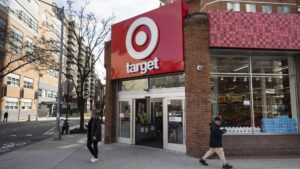Target’s DEI Retreat: What It Means for Consumers and Investors
In an era of increased awareness regarding diversity, equity, and inclusion (DEI), the recent actions of major retailers like Target have sparked significant conversations within communities and markets. As emotional ties to corporate responsibility clash with financial imperatives, the discourse surrounding Target’s strategies has become a flashpoint in the retail industry.
The Meeting that Caused a Stir
On March 6, 2025, Target’s CEO Brian Cornell met with civil rights leader Rev. Al Sharpton in New York, prompting an intense examination of the retailer’s commitment to DEI initiatives. This meeting comes in the wake of Target’s controversial decision to roll back many of its DEI programs, which has led to increased calls for boycotts from various civil rights organizations.
Rev. Sharpton has expressed his discontent over the changes, and while he has not officially called for a Target boycott, he has signaled willingness to support similar actions if the company fails to reaffirm its commitments to the Black community and equally invest in Black-owned businesses. He remarked, "You can’t have an election come and all of a sudden, change your old positions," highlighting the belief that corporate ethics should remain steadfast regardless of political landscapes.
Unpacking the Backlash
Target’s roll-back of DEI initiatives was reportedly followed by a noticeable decline in foot traffic—a staggering 10 consecutive weeks of year-on-year decline shortly after their announcement in January. This trend reflects not just discontent with the corporation’s decisions but illustrates the growing consumer movement towards brands that practice and promote inclusivity.
That said, the metrics presented by analytics firm Placer.ai indicates more than just a backlash against DEI reductions. They touch upon broader concerns for Target, including fluctuating sales and increased competition from retailers maintaining a strong commitment to diversity, such as Costco, which saw an increase in traffic during the same period.
A Retail Landscape in Flux
Target is not alone in this dilemma. Major players like Walmart and McDonald’s have also curtailed certain DEI programs, influenced by fear of alienating specific segments of their customer base. On the contrary, Costco has risen above these pressures, showing that maintaining a commitment to DEI can be beneficial for business. Costco’s shareholder meeting earlier this year highlighted shareholder interest in preserving DEI measures against backlash, suggesting a long-term commitment to ethical practices can indeed win consumer loyalty.
Target’s pause on its DEI efforts could be seen as a strategic misstep that further complicates its extensive post-pandemic recovery strategy. The challenges are multifaceted: from inventory mismanagement to losses from theft, and adverse shifts in consumer product priorities, it’s clear that the retailer is grappling with systemic issues that extend beyond just one policy change.
Future Directions and Investor Implications
In a crucial moment where corporate practices can sway public opinion, Target’s decision to revisit its DEI commitments may determine not just the company’s immediate sales forecasts but its long-term viability in an evolving marketplace. Investors must carefully consider how public sentiment, aligned with the growing impact of social justice movements, could influence future revenue streams.
At Extreme Investor Network, we believe that informed investing goes beyond just the figures. It blends ethics with strategy; understanding the societal implications of a company’s actions is as paramount as financial performance. As consumers continue to express their preferences for equitable policies, companies willing to adapt and invest in genuine community engagement, as Sharpton urged Target to do, may stand to benefit significantly, both socially and financially.
Call to Action
As stakeholders in the economy and society, it’s essential for consumers and investors alike to demand accountability from corporations. Keep an eye out for how Target and others in the retail sector respond to these challenges, as the decisions made today will undoubtedly shape market dynamics for years to come.
Stay connected with Extreme Investor Network, where we analyze trends and provide insights that go beyond surface-level financial metrics, helping you make informed decisions in an ever-evolving marketplace.

